Understanding Time
Time is a fundamental dimension in the universe. It allows us to sequence events, compare the durations of events and the intervals between them, and quantify the motions of objects. In scientific terms, time is often considered as the fourth dimension, along with the three spatial dimensions.
Key Concepts about Time
- Units of Time: Time can be measured using units such as seconds, minutes, hours, days, and years. Understanding the conversion between these units is crucial for scientific calculations.
- Time as a Coordinate: In physics and astronomy, time is often used as a coordinate along with the three spatial coordinates to describe the position and motion of objects in the universe.
- Relativity of Time: According to Einstein's theory of relativity, time is not absolute and can be perceived differently by observers in different reference frames.
- The Arrow of Time: The concept of the arrow of time refers to the asymmetry of time, where it moves in a single direction from the past, through the present, and into the future.
Applications of Time in Science
Time is a crucial parameter in various scientific phenomena and disciplines:
- Astronomy: Time is used to measure the motions of celestial objects, calculate the age of the universe, and predict astronomical events such as eclipses and transits.
- Physics: In physics, time is a key component in the equations describing motion, energy, and forces. It is also a fundamental concept in the theories of relativity and quantum mechanics.
- Biology: Biological processes are often regulated by biological clocks, which are internal timing mechanisms that control the timing of activities such as sleep-wake cycles, metabolic processes, and seasonal behaviors in organisms.
Studying Time in Science
As a student of science, it is important to grasp the concept of time and its applications. Here are some tips for studying time in science:
- Understanding Units: Familiarize yourself with the different units of time and practice converting between them.
- Relativity and Time: Explore the concept of time dilation in special and general relativity, and understand how time can be perceived differently in different reference frames.
- Experimental Methods: Study the experimental methods used to measure time accurately, such as atomic clocks and astronomical observations.
- Real-life Examples: Look for real-life examples where the concept of time is crucial in scientific research and discoveries, and understand how time impacts various natural phenomena.
◂Science Worksheets and Study Guides Fourth Grade. Light and Sound
Study Guide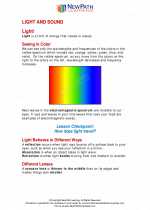 Light and sound
Light and sound  Worksheet/Answer key
Worksheet/Answer key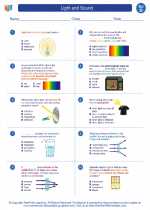 Light and sound
Light and sound  Worksheet/Answer key
Worksheet/Answer key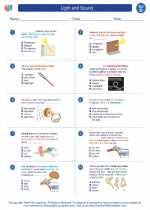 Light and sound
Light and sound  Worksheet/Answer key
Worksheet/Answer key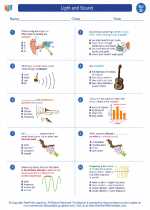 Light and sound
Light and sound  Vocabulary/Answer key
Vocabulary/Answer key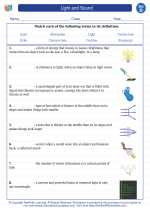 Light and sound
Light and sound  Vocabulary/Answer key
Vocabulary/Answer key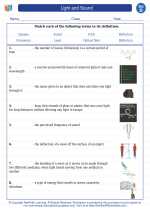 Light and sound
Light and sound  Vocabulary/Answer key
Vocabulary/Answer key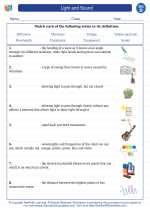 Light and sound
Light and sound 

 Worksheet/Answer key
Worksheet/Answer key
 Worksheet/Answer key
Worksheet/Answer key
 Worksheet/Answer key
Worksheet/Answer key
 Vocabulary/Answer key
Vocabulary/Answer key
 Vocabulary/Answer key
Vocabulary/Answer key
 Vocabulary/Answer key
Vocabulary/Answer key

The resources above cover the following skills:
PHYSICAL SCIENCE (NGSS)
Waves and their Applications in Technologies for Information Transfer
Students who demonstrate understanding can:
Develop a model of waves to describe patterns in terms of amplitude and wavelength and that waves can cause objects to move.